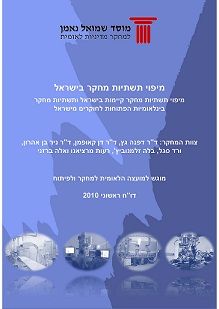The Neaman Institute won a tender of the Israel National Council for Research and Development – the National Committee for Research Infrastructures (VATAM) – through the Science and Technology Ministry – to conduct a study with respect to the mapping of national research infrastructures.
The purpose of the research is the mapping of the existing national research infrastructures and the definition of the needs of Israeli researchers with respect to the upgrade and establishment of new research infrastructures.
The research was conducted in 2010 and focused on the equipment and facilities included in the research infrastructure. A center with scientific/technological equipment that is a candidate for being recognized as a national research infrastructure must meet the following criteria:
- The infrastructure serves more than one institution and more than one research group.
- The infrastructure is open to all the researchers in this area in Israel (researchers from academic research institutions, hospitals, industrial companies and so on) even if payment is involved.
- The infrastructure contains scientific/technological research equipment exceeding 10 million shekels (about $2.5 million) or more.
- The infrastructure is on the leading technological-research level, relative to the situation in the scientific world.
The mapping study is intended to build the knowledge and data base that will allow the state of Israel to build a road map for planning, improving, and establishing national research infrastructures. The work consists of three major parts covering the subjects:
- A. Mapping existing research infrastructures in Israel.
- Evaluating future needs for research infrastructures.
- Comparing Israel with similar countries regarding research infrastructures.
The study reviewed research infrastructures in which R&D activity takes place with respect to the overall spectrum of scientific and technological fields: Biology and Medical Sciences, Materials, Exact Sciences, Environment, Energy, Humanities and Social Studies. The reviewed research infrastructures can be found in academic institutions, research institutes, industrial companies, hospitals and government, public and private institutions and organizations. The mapping does not include organizations and institutions with unique equipment used for the implementation of security-related R&D, unless they also serve the civil R&D.
The findings of the research were concluded into a report describing the . The report includes two chapters: The first chapter describes the mapping of the research which exist in Israel and includes the methodology for mapping and the conclusion of the main data relating to the 88 research infrastructures mapped. It was found that 53% of the research infrastructures are located at universities and higher education institutes, 36% are located at public and governmental institutions and 11% are located at the industry. Also, it was found that 28 infrastructures fully meet the four criteria that were used to define research infrastructures.
To complete the picture of the available to researchers in Israel, the second chapter deals with the 9 international research infrastructures whose usage by Israeli researchers is funded by governmental budgets.
An additional report, which was submitted to the MOLMOP, deals with the future needs related to establishing new research infrastructures and effecting significant improvements in the existing research infrastructures. The report includes a comparison between Israel and several other countries that are similar in terms of size and technological level, and also includes a summary regarding the information and computerization system that was established for collecting and processing the data gathered through the different research questionnaires during this work.












